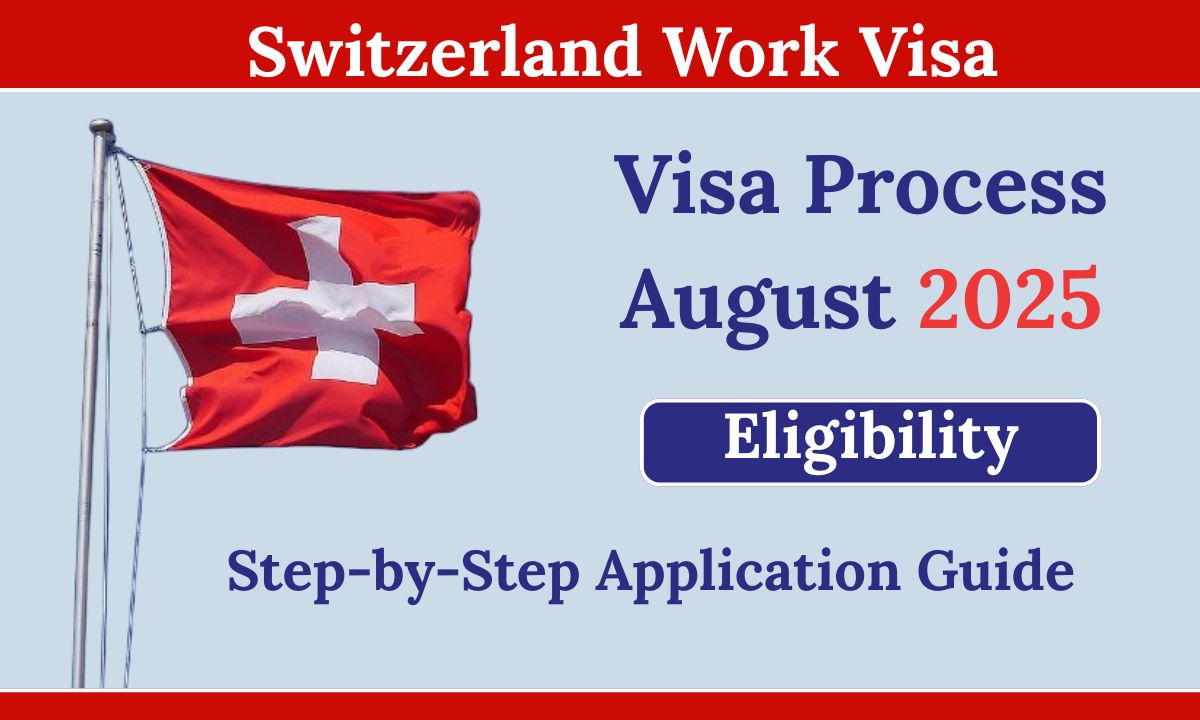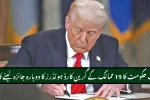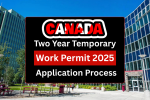Switzerland Work Visa Process 2025: Eligibility, Quotas & Step-by-Step Application Guide. Switzerland continues to be one of the most attractive destinations for skilled professionals worldwide. Its strong economy, high living standards, and diverse job opportunities make it a preferred choice for both EU/EFTA and non-EU nationals.
However, securing a Swiss work visa in 2025 remains a structured and regulated process. Whether you are aiming for a short-term assignment, long-term employment, or cross-border commuting, understanding the permit types, quotas, eligibility criteria, and step-by-step application process is crucial.
This article provides a comprehensive Switzerland work visa guide for 2025, including detailed explanations, official procedures, and practical tips to improve your chances of approval.
Overview of Swiss Work Permits
In Switzerland, work permits are primarily employer-driven. Most non-EU/EFTA nationals cannot apply independently—they require sponsorship from a Swiss employer. There are several permit types depending on job duration, residency, and commuting status:
| Permit Type | Duration | Purpose | Notes |
|---|---|---|---|
| L Permit | 3–12 months | Short-term residence | Can be extended; often for project staff or temporary assignments |
| B Permit | ≥12 months or unlimited | Long-term residence | Renewable annually; highly sought by non-EU/EFTA nationals |
| G Permit | Commuter basis | Cross-border workers | For those living in neighboring countries like France, Germany, Italy, Austria |
| C Permit | Permanent | Settlement | Granted after several years of residence; not an initial work permit |
Note: EU/EFTA nationals enjoy simplified procedures and are not subject to strict quotas like third-country nationals.
2025 Quotas for Non-EU/EFTA Workers
Switzerland maintains annual quotas for non-EU/EFTA workers, ensuring local job markets are protected. For 2025, the federal quota allocations are:
| Permit Type | Allocated Quota | Purpose |
|---|---|---|
| L Permit | 4,000 | Short-term employment |
| B Permit | 4,500 | Long-term employment |
These quotas are finite and distributed among the Swiss cantons. Employers must comply with quota limits and demonstrate that no local Swiss or EU/EFTA candidate can fill the position. Quotas also include specific allocations for UK nationals following Brexit adjustments.
Who is Eligible for a Swiss Work Visa?
Eligibility depends on your nationality and professional profile.
1. EU/EFTA Nationals
- Easier access to the labor market.
- Typically no strict quotas.
- Permits are issued more readily, often upon registration in the commune (local authority).
2. Non-EU/EFTA Nationals (Third-Country Nationals)
- Only highly qualified professionals or roles that cannot be filled locally are considered.
- Employers must prove extensive recruitment efforts within Switzerland and the EU/EFTA.
- Approval is contingent on available quotas, labor market tests, and proof of Swiss-level pay and employment conditions.
Pro Tip: If you are a third-country national, your employer must provide detailed evidence showing no suitable Swiss or EU/EFTA candidate was found. This is a critical factor in visa approval.
Switzerland Work Visa Process 2025
The Swiss work visa application is a multi-stage process, usually initiated by your employer. Here’s a practical step-by-step guide:
Step 1: Secure a Job Offer
- Obtain a signed employment contract including:
- Job title and full description
- Salary and benefits
- Duration of employment
- Working hours and location
This contract forms the core of the visa application.
Step 2: Employer Submits Permit Request
- The employer submits your permit request to the cantonal migration office.
- Cantonal authorities assess:
- Local labor market conditions
- Whether a Swiss/EU candidate could fill the role
- Documentation of recruitment efforts is mandatory for third-country nationals.
Step 3: Cantonal Approval & Quota Verification
- If approved by the canton, the application may be forwarded to federal authorities and SECO for review.
- Cantonal offices confirm quota availability and compliance with labor market regulations.
Step 4: Visa Application at Swiss Embassy/Consulate
- Once approved, the applicant applies for an entry visa at the Swiss embassy or consulate in their home country (if required).
- EU/EFTA nationals often bypass this step, registering directly upon arrival.
Step 5: Arrival & Local Registration
- Upon entering Switzerland:
- Register with your local commune (town hall)
- Receive your permit card (B or L)
- Enroll in mandatory Swiss health insurance
Following registration, you are officially authorized to work and reside in Switzerland.
Documents Required for Switzerland Work Visa
Requirements may vary by canton and role. Standard documents include:
| Document | Purpose |
|---|---|
| Signed employment contract | Confirms job offer and salary |
| Passport copy & photos | Identification |
| CV, diplomas, professional certificates | Qualifications proof (attested if required) |
| Proof of recruitment efforts | Demonstrates no local/EU candidate available |
| Police certificate / criminal record | Security clearance |
| Health insurance confirmation | Mandatory coverage upon arrival |
Tip: All documents may need translation, notarization, or apostille certification, depending on canton rules.
Practical Tips to Improve Approval Chances
- Ensure your employer offers Swiss-level compensation and benefits.
- Apply well before quotas are exhausted; early submissions increase likelihood of approval.
- Provide complete and accurate documentation, including translations where needed.
- Maintain clear communication with the employer’s HR or PRO team.
Realistic Timelines
- Job Offer & Employer Submission: 1–2 weeks
- Cantonal Processing & Quota Check: 4–8 weeks (varies by canton)
- Federal Approval: 2–6 weeks for third-country nationals
- Embassy Visa Processing: 1–3 weeks
EU/EFTA nationals usually complete registration in 1–2 weeks after arrival.
Key Takeaways
- Switzerland work visa in 2025 is primarily employer-driven.
- Permit type depends on job duration, commuting status, and nationality.
- Quotas are strictly enforced for third-country nationals: 4,000 L permits and 4,500 B permits.
- Employers must prove local labor market efforts and offer Swiss-level pay.
- Documentation, translations, and attestation are critical for approval.
FAQs – Switzerland Work Visa 2025
Q1: Can I apply for a Swiss work visa without an employer?
A: No, non-EU/EFTA nationals require an employer to initiate the work permit application.
Q2: How long does a B permit last?
A: Typically 12 months, renewable annually as long as employment continues.
Q3: What is the difference between L and B permits?
A: L permits are for short-term employment (3–12 months), while B permits are for longer-term employment or unlimited contracts.
Q4: Are quotas the same across all Swiss cantons?
A: No, quotas are distributed by canton and vary based on cantonal labor market needs.
Q5: Do EU/EFTA nationals need a visa to work in Switzerland?
A: Generally, no visa is required; they register locally upon arrival.
Q6: What documents are mandatory for third-country nationals?
A: Employment contract, passport, CV, professional certificates, police clearance, proof of recruitment efforts, and health insurance confirmation.
Switzerland remains an excellent destination for skilled professionals seeking global career exposure. By understanding the work visa process, eligibility, quotas, and application steps, applicants can navigate the system confidently and increase their chances of obtaining a Swiss work permit in 2025.

